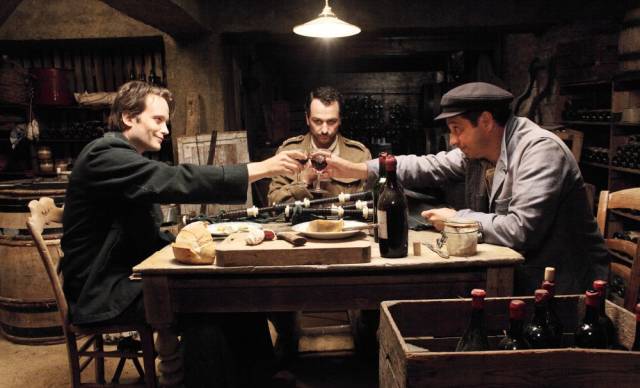
 Director Christian Carion made his name with the 2005 film Joyeux Noël, which told the true story of an unofficial armistice that took place on Christmas of 1914 between French and German troops. The moment might be seen as the last gasp of those who proclaimed they’d be home for the holidays as they marched into a cataclysmic war that was not only unparalleled in its physical destruction, but also signaled the arrival of a dizzying new age of destruction, urbanization, alienation, and a second massive, global war. The death of the old world had one last vigil in 1914 when armies still had gentlemen’s agreements and real, profound truces.
Director Christian Carion made his name with the 2005 film Joyeux Noël, which told the true story of an unofficial armistice that took place on Christmas of 1914 between French and German troops. The moment might be seen as the last gasp of those who proclaimed they’d be home for the holidays as they marched into a cataclysmic war that was not only unparalleled in its physical destruction, but also signaled the arrival of a dizzying new age of destruction, urbanization, alienation, and a second massive, global war. The death of the old world had one last vigil in 1914 when armies still had gentlemen’s agreements and real, profound truces.
In his new film, Come What May, that second war is taken as the subject. Here, we see a leftist German dissident (August Diehl) flee his country with his young son (Joshio Marlon) to the French countryside. After briefly (and poorly) passing for a Belgian farmer, the father is imprisoned by French authorities, just as German troops cross into the French border and begin their inexorable march to Paris. His son, left in the care of a local school teacher (Alice Isaaz), is then taken along with the rest of the village as they evacuate and join a massive train of refugees fleeing the Nazi advance. Meanwhile, an attack on the jail that is housing the father allows him to escape and pursue his son.
The village’s progress mostly centers on the mayor (Olivier Gourmet), who plays the sort of gruff, noble man-in-charge that feels quaint even in historical fiction. This nostalgic gloss is pervasive. As the situation gets more dire for our band of travelers, Carion is so gentle a director with such a keen of an eye for the delights of pre-modern French living that he never really delivers any jarring idea of a refugee’s experience. Even though Carion has moved from World War I to World War II in this new film, his approach is basically the same, eliding any suggestion of a paradigmatic shift in quality between the two wars.
It is a frictionless movie, built on fortuitous reunions and desperate measures coming off without a hitch, but it is not without some very compelling highlights. Matthew Rhys of FX serial, The Americans, appears as a Scottish soldier who injects some life in his scenes. And to fill the role of Main Nazi, Carion went with the artist/sociopath variety. The only real villain in this story is a man wielding a movie camera, working on a staged production of the war to send back to Germany as propaganda. It’s a very self-implicating move for a filmmaker. I wonder if the villain was inserted with this much self-awareness, but he certainly reminds you that there is no such thing as a quaint, apolitical war movie. The easier it goes down, the warier the viewer should be.